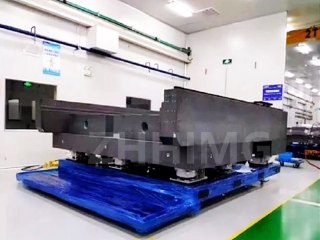A Granite base for industrial computed tomography (CT) is a specially designed platform that provides a stable and vibration-free environment for high-precision CT scanning. CT scanning is a powerful imaging technique that uses X-rays to create 3D images of objects, providing detailed information about their shape, composition, and internal structure. Industrial CT scanning is widely used in fields such as aerospace, automotive, electronics, and materials science, where quality control, defect detection, reverse engineering, and nondestructive testing are essential.
A Granite base is typically made of a solid block of high-grade granite, which has excellent mechanical, thermal, and chemical stability. Granite is a naturally occurring rock that is composed of quartz, feldspar, and mica, and has a uniform and fine-grained texture, which makes it ideal for precision machining and metrology applications. Granite is also highly resistant to wear, corrosion, and deformation, which are critical factors in ensuring the accuracy and reliability of CT scanning.
When designing a Granite base for industrial CT, several factors must be considered, such as the size and weight of the object to be scanned, the accuracy and speed of the CT system, and the ambient conditions of the scanning environment. The Granite base must be large enough to accommodate the object and the CT scanner, and must be machined to a precise level of flatness and parallelism, typically less than 5 micrometers. The Granite base must also be equipped with vibration dampening systems and thermal stabilization devices to minimize external disturbances and temperature variations that can affect the quality of the CT scan.
The benefits of using a Granite base for industrial CT are numerous. Firstly, Granite is an excellent thermal insulator, which minimizes heat transfer between the object and the surrounding environment during scanning, reducing thermal distortion and improving image quality. Secondly, Granite has a low coefficient of thermal expansion, which ensures dimensional stability over a wide range of temperatures, and enables accurate and repeatable measurements. Thirdly, Granite is non-magnetic and non-conductive, which makes it compatible with various types of CT scanners and eliminates interference from external electromagnetic fields.
In conclusion, a Granite base for industrial CT is a crucial component that can significantly enhance the accuracy, speed, and reliability of CT scanning. By providing a stable and vibration-free platform, a Granite base enables high-precision imaging of complex objects, leading to improved quality control, product development, and scientific research.
Post time: Dec-08-2023

